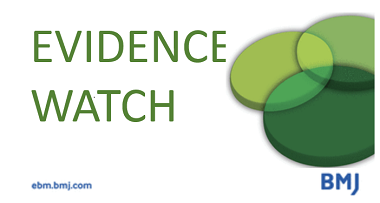The problems with transvaginal mesh are longstanding and have gone on far too long
Carl Heneghan

This week the UK put a temporary ban on surgical mesh for stress urinary incontinence. Julia Cumberlege, who chaired the review, said: “I have been appalled at the seriousness and scale of the tragic stories we have heard from women and their families. This ban follows the NICE recommendation in December 2017, to restrict the use of mesh in prolapse to research only. The reasons for this ban, though, are long-standing and here’s five of those reasons that have contributed:
Reason 1:
It’s been 13 years since NICE stressed the need to inform women of the lack of long-term outcomes, and `Cochrane recommended the need for studies with longer term follow up. Little has changed over time and there is still a lack of high-quality long-term data to inform the use of mesh. When long-term data is produced it is often poor quality (riddled with bias) lacks a control group, has substantial losses to follow-up and has ridiculously small sample sizes. This type of evidence, therefore, has added little to the safety debate.
Reason 2:
Ten years ago, the FDA first alerted practitioners of the medical complications associated with transvaginal mesh. In 2008 the FDA released a review identifying serious safety concerns and adverse events. This review corrected former 2008 statement that side effects are not rare. “The most common mesh-related complication experienced by patients undergoing transvaginal POP repair with mesh is vaginal mesh erosion.”…..”More than half of the women who experienced erosion from nonabsorbable synthetic mesh required surgical excision in the operating room. Some women required two to three additional surgeries.
Reason 3:
A significant number of mesh devices have been removed from the market (likely more than 80%). For example, in 2012 announced it would no longer sell Gynecare Prolift, Gynecare Prolift+ M, Gynecare TVT Secur and Gynecare Prosima surgical meshes. The company-maintained safety concerns did not play a role in the decision. However, it is incompatible with patient safety to have so many devices on the market at any one time, to then remove them at will, and subsequently replace them with mesh devices that do not provide new evidence to inform their use and somehow hope women will remain safe.
Reason 4:
Over the last 20 years. transvaginal mesh products for pelvic organ prolapse have been approved on the basis of weak evidence – this is an understatement as often it’s no evidence – and they have inherited approval status using equivalence from just a few products. This regulatory lax approach to the approval of devices is inexcusable and made it inevitable that problems would occur and women would be exposed to avoidable harms
Reason 5:
One woman saying there is a problem might be seen as an outlier. But when you have groups in England, Wales, Ireland, Sweden, when you have over 6000 women in the Sling the Mesh Facebook support group, when over 100,000 women are in US litigation then you must accept there is one humongous problem.
Yet, health professionals continual denial and dismissal of the problems with mesh, the use of poor quality evidence to shore up their arguments (a little bit of EBM training wouldn’t go amiss) and defensive statements that often ignore patients and pretends everything is OK remains a significant problem to progress, and it has ensured the problems with mesh have been perpetuated and gone on far too long.
BMJ Evidence-Based Medicine – original evidence-based research, insights and opinion
Read more in the Welcome to BMJ Evidence-Based Medicine Editorial.

Competing interests
Carl has received expenses and fees for his media work including BBC Inside Health. He holds grant funding from the NIHR, the NIHR School of Primary Care Research, The NIHR Oxford BRC and the WHO. He has also received income from the publication of a series of toolkit books. CEBM jointly runs the EvidenceLive Conference with the BMJ and the Overdiagnosis Conference with some international partners which are based on a non-profit model.